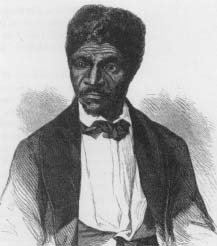Dred Scott Decision: 1856
Scott Tries Federal Courts
Following the Missouri Supreme Court's decision, the case was sent back to Judge Hamilton in St. Louis, who was supposed to issue the final order dismissing the case and returning Scott to slavery. Hamilton procrastinated, however, which gave Scott time to hire a new lawyer and get his case into the federal courts. Scott replaced Field and Hall. His new lawyer was Roswell M. Field, who was unrelated to the previous Field. The new Field realized that Sanford had moved to New York City, and was therefore no longer a resident of Missouri. Therefore, Field initiated new proceedings on November 2, 1853, in federal court, under legal provisions that give federal courts jurisdiction over cases between citizens of different states. This principle is called "diversity jurisdiction," and is still valid today. Diversity jurisdiction enabled Scott, as a citizen of Missouri, to sue Sanford, as a citizen of New York, in federal court. The issue of Scott's freedom was now before Judge Robert W. Wells of the U.S. Court for the District of Missouri, located in St. Louis.
 The Supreme Court held that Dred Scott, above, was his owner's property and the only "rights" at issue were those of the owner.
The Supreme Court held that Dred Scott, above, was his owner's property and the only "rights" at issue were those of the owner.
At the circuit court's 1854 April Term, Wells held that Scott was a Missouri "citizen" for diversity jurisdiction purposes, despite the fact of Scott's slavery. The case then went to trial, which was held on May 15, 1854. In this, Scott's third freedom trial, the jury ruled in Sanford's favor and held that Scott was still a slave. This was despite the fact that Wells, who was a Southerner, was sympathetic to Scott's cause. Field promptly appealed to the U.S. Supreme Court in Washington, D.C. He convinced the distinguished lawyer Montgomery Blair to represent Scott before the Supreme Court, although Scott was virtually penniless.
Blair, who also was originally from Missouri, had successfully pursued political and legal ambitions in Washington. His residence was the now-famous Blair House on Pennsylvania Avenue. Blair was assisted by George Ticknor Curtis. With the assistance of Southern pro-slavery interests, who recognized the potential importance of the Scott case, Sanford also retained some very eminent lawyers. Sanford was represented before the Supreme Court by former Senator Henry S. Geyer, who like Blair had come from Missouri and made a name for himself as a Washington lawyer. Geyer was assisted by former Senator and U.S. Attorney General Reverdy Johnson, who was a personal friend of Chief Justice Roger B. Taney.
Additional topics
- Dred Scott Decision: 1856 - Victory For Slavery, Defeat For Scott
- Dred Scott Decision: 1856 - Scott Sues For Freedom
- Other Free Encyclopedias
Law Library - American Law and Legal InformationNotable Trials and Court Cases - 1833 to 1882Dred Scott Decision: 1856 - Scott Sues For Freedom, Scott Tries Federal Courts, Victory For Slavery, Defeat For Scott